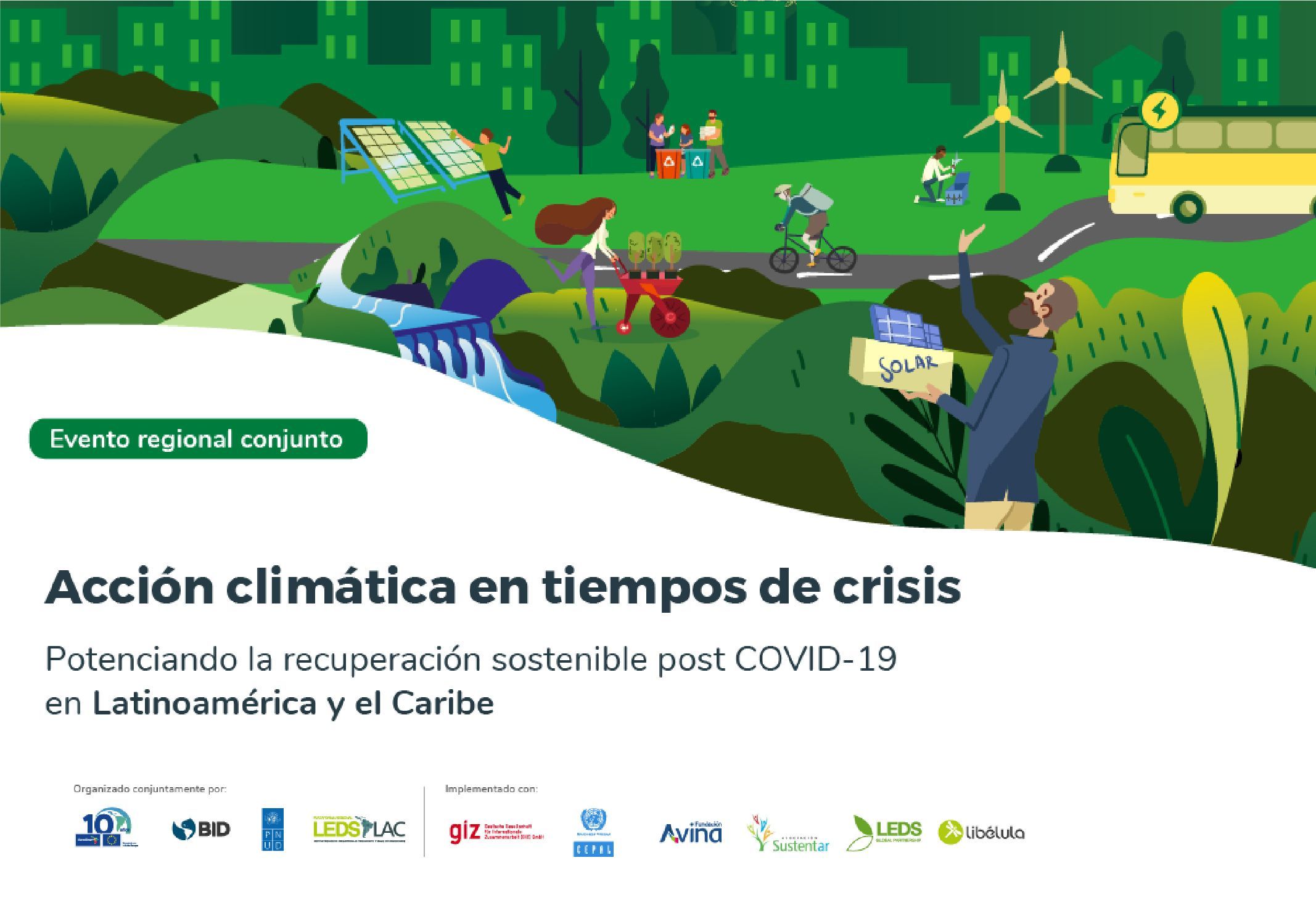The event, held between September and December 2020, brought together different actors from the climate action of Latin America and the Caribbean
Lima, December 16, 2020. The year 2020 brought with it important global challenges, which have required joint and coordinated action at the global level, and which project the need for concrete actions to address the crisis generated by COVID-19.
In this context, climate action has an important role and task of not neglecting climate commitments in a context of post-pandemic recovery priorities, and taking the opportunity to move towards a low-emission development path through the formulation of recovery strategies consistent with national and global goals.
Thus, and through a series of virtual sessions held between September and December, the Joint Regional Event: "Climate Action in Times of Crisis: Enhancing Sustainable Post-COVID-19 Recovery in Latin America and the Caribbean" articulated a platform for discussion, meeting, and exchange, which had a special focus on giving visibility to experiences and strategies in the region, to accelerate and increase climate ambition within the framework of the global post-pandemic recovery agenda.
This event was jointly organised by EUROCLIMA+, through the Dialogue among Peers initiative implemented by ECLAC and the German Society for International Cooperation (GIZ), the Inter-American Development Bank (IDB), the United Nations Development Programme (UNDP) and the LEDS LAC Platform; it had more than 5,200 participations in 34 different virtual activities, sharing more than 60 experiences from countries in the region.
Experiences from the region, the contribution of EUROCLIMA+
The joint event was structured around three thematic axes: Long-term strategies with the IDB; Increased ambition in NDCs, organised by the EUROCLIMA+ Dialogue among Peers initiative and UNDP; and the axis of sectoral action: transport, led by the Sustentar organisation.
Based on three previous thematic axes, a series of activities were carried out such as exchanges, webinars, panels of experts, discussions and collaborative work, with representatives of the different countries of the region and actors in global climate action where the various challenges and opportunities facing Latin America and the Caribbean were addressed in a view towards a green, just recovery and that leaves no one behind.
Thus, various milestones were part of EUROCLIMA+'s contribution to the event. Among the main milestones we find:
Inauguration hub
Dialogue Among Peers
- Launch LAC NDC tool
- Microtalks for climate: non-state actors talk about increasing climate ambition in Latin America
- II Dialogue among peers: First session | Second session | Third session
- Green recovery and climate action from an economic policy viewpoint -
Regional Collaboration on the transparency and completion of Nationally Determined Contributions and capacity building for Long-Term Climate Strategies
-Fair Transition in future ecological transformation Scenarios
Community of Practice on Private Sector and Climate Policies
- Involving the Private Sector in LTS
Closing session Joint Regional Event
Main messages collected
Based on learning and discussions shared during the three months of work, the following key messages could be collected:
- Long-term climate strategies should be developed on the basis of scientific evidence and through a participatory process.
- Climate action is also an engine of economic recovery and the contribution of non-state agents (the private sector, academia, non-governmental organisations and young people) is of particular relevance.
- In the current context, a fair transition must emphasise equity and job creation in order to achieve social acceptance, political support, and financial resources that drive structural changes.
- Rates of inequality and vulnerability to climate change in the region require convergence of the social agenda and climate agenda.
- Economic recovery must have a transformative vision, fostering innovation and a circular economy for sustainable development and poverty reduction.
- To achieve effective climate governance in the region, three pillars should be considered: generating compatible information, improving regulatory frameworks, and facilitating access to finance.
- Decarbonisation objectives should be integrated into decision-making, policy planning, and investment processes.
- Ambition in terms of adaptation needs to be increased, since adaptation is cost-effective. Greater efforts are required in generating reliable metrics to track progress made.
- The Latin American and Caribbean region has great possibilities for decarbonising certain sectors, such as transport. Today, this sector has not yet released its potential in terms of, for example, the use of renewable energy as the main source.
- Fostering the implementation of pilot projects in the region can trigger change in terms of building trust and security for attracting investment.
The main findings, as well as the audiovisual material of the 2020 Joint Event are available at the following link: https://ledslac.org/es/evento-conjunto-2020/
About EUROCLIMA+
EUROCLIMA+ is the European Union's flagship programme for cooperation with Latin America. It aims to reduce the impact of climate change and its effects on the region, promoting climate change mitigation and adaptation, resilience, and climate finance.
It is implemented in 18 countries in Latin America and the Caribbean under the synergistic work of seven agencies: the Spanish Agency for International Cooperation for Development (AECID), French Development Agency (AFD), Economic Commission for Latin America and the Caribbean (ECLAC), the German Society for International Cooperation (GIZ), Expertise France (EF), the International and Ibero-American Foundation for Public Administration and Policy (FIIAPP) , and the UN Environment Programme.

